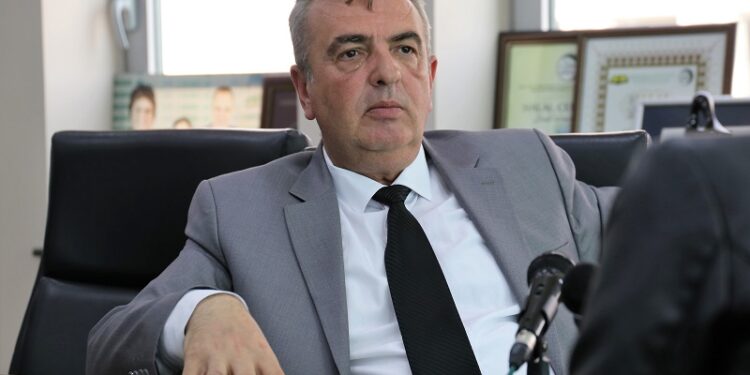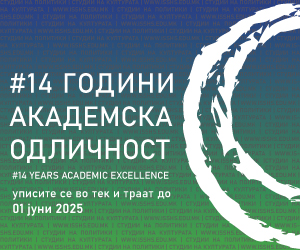Technology, innovations, science put in the function of businesses are always interesting and current topics. The development path of the first biogas thermal power plant in Macedonia for production of electricity was told by the General Director of “Veze Sharri”, Abdulezel Dogani, who explained how the “Veze Sharri”, “Leker”, “Elektro Sharri” companies, as well as the investment “Golden Land” near Prilep, create a closed system of a contemporary circular economy.
The capacity of the facility for production of electricity is 1 megawatt per hour, namely, 8,760,000 kilowatt hours per year.
“The waste and by-products from the Veze Sharri farm, along with other agricultural waste from farmers from the surrounding area are used as raw materials for production of electricity, as well as waste from the cattle farm in Prilep, because currently the new biogas power plant has still not been built in this area. In “Elektro Sharri”, waste is not treated as waste, but as a renewable energy source, from which after the methane has been burned, electrical and thermal energy is obtained. The remaining part, after fermentation, is again processed for production of organic fertilizer-enhancer of soil properties in the amount of 8,000 tons annually. The NATUREPURE organic fertilizer, as a product, has been approved and registered in the relevant institutions and it has been approved for export to European Union countries by meeting the highest international standards of quality, health and environmental safety”, explains Dogani.
He adds that the idea for the biogas power plant was born when they noticed that during the development of the poultry farm with about 20,000 laying hens at the beginning, whose number then grew to the present 120,000, waste from feces was created that the soil could not absorb, thus the idea and optimism, but also the vision motivated owner Arben Abdurahmani to build the biogas plant in 2013, in order to close the process of operation of the companies according to the principles of circular economy.
“Chickens are constantly producing waste. Why throw that too away. At one point, “Veze Sharri” entered into another investment and with state subsidies the ‘Elektro Sharii’ biogas plant started operating”, says Dogani.
He says that the surplus of electricity is connected to the EVN grid, but when the price rises on the stock market, or when there is a shortage, such as last winter, it fully meets the needs of the company, and what is also a benefit from the production process is the heat that is used in the three companies, but also in the administrative part of the buildings, for which additional funds from the company’s budget are not used.
“We had several attempts to offer thermal energy to schools and hospitals, but also to the homes of the local residents, which are located in Tetovo, and for free, but we did not finds understanding from the authorities, because according to them, the investment to bring this heat to the facilities would be expensive. In my opinion, sometimes it’s worth investing in an installation that will serve the citizens, as the savings from the use of derivatives for heating and also for electricity, are huge in the long-term period”, explains Dogani.
He adds that the last two years have shown the shortcomings, particularly in the energy sector when the energy crisis emerged, and we can conclude that we in Macedonia have energy that lies somewhere, whether it be solar, wind or waste, and that consideration should nevertheless be put on alternative ways of production.
“Photovoltaics, for example, have a limited manner of production, of course they produce during the day, while at night there is no way to produce electricity, it’s similar with production of electricity from wind. Still, they are good alternatives, but in my opinion power plants do offer a more stable production of electricity, but in order to motivate most companies, it is necessary to update the electrical grid so that it can receive more electricity that is produced, but also greater market liberalization, both in terms of the documentation and in terms of the prices. It is a fact that there is much waste in the country and it is a fact that this way will not only protect the environment, but the citizens will also benefit from that waste that is currently ending up in the landfills”, he adds.
“Veze Sharri” is not a completely Macedonian investment. Before opening the farm in the Tetovo village of Trebosh, Abdurahmani worked in Germany, so part of the investment is also of the German partner, and the German experience of the owner nonetheless showed to be a big advantage later in building the company.
“Vese Sharri” is an export company, with export mostly being to Croatia and Greece. After being approved by the US Army, the company became a supplier also for NATO.
Dogani is decisive that the company has developed and is continuously focused on modernization and new technologies.
“To function without modern technology, that’s a mission impossible. In “Veze Sharri”, one person controls the complete production of a shift, or three people carry out the control during 24 hours. And that technology doesn’t function without the use of tools. You have to have fantastic internet to be able to perform monitoring of the production the entire time. You also have to use mobile phones, because the entire coordination of everything that is going on in the company is performed from here”, says Dogani.
He also adds that money that needs to be invested in business is not the problem in the country, but rather lack of labor force, especially qualified one, but also reforms in education.
Sonja Taneska
Video and editing: Arian Mehmeti
Photography: Biljana Jordanovska
Translation: N. Cvetkovska
The video is part of the large regional initiative for marking the Western Balkans Circular Economy Week (May 22-26, 2023) under the slogan “Partnership for Circularity” that is implemented by the LogEx regional network, of which CIVIL is a member, at the initiative of the prominent think-tank organization Balkan Forum from Kosovo, and with the support of Rockefeller Brothers Fund from the United States.




















